Snapchat: Taking Gen Z to the Polls
Role: Writer (Born in 1996)
For Gen Z, voting is new. Being politically active isn’t. Snapchat knows the political power of Gen Z. They helped over 1.2 million young people register to vote. To showcase Gen Z’s political might, T Brand Studio and Snapchat profiled five young activists who changed their communities before they were eligible to vote.
The work was written by, illustrated by, and all about Gen Z, a first for T Brand Studio.
Press: The Top 100 Branded Content Partnerships of 2020 (#7)
Digiday Media Awards 2021: Best Content Studio
Read It Here. (Or below.)
Promotional Banner Ads on NYTimes.com:

Print Ad:
Promotional Headlines on NYTimes.com

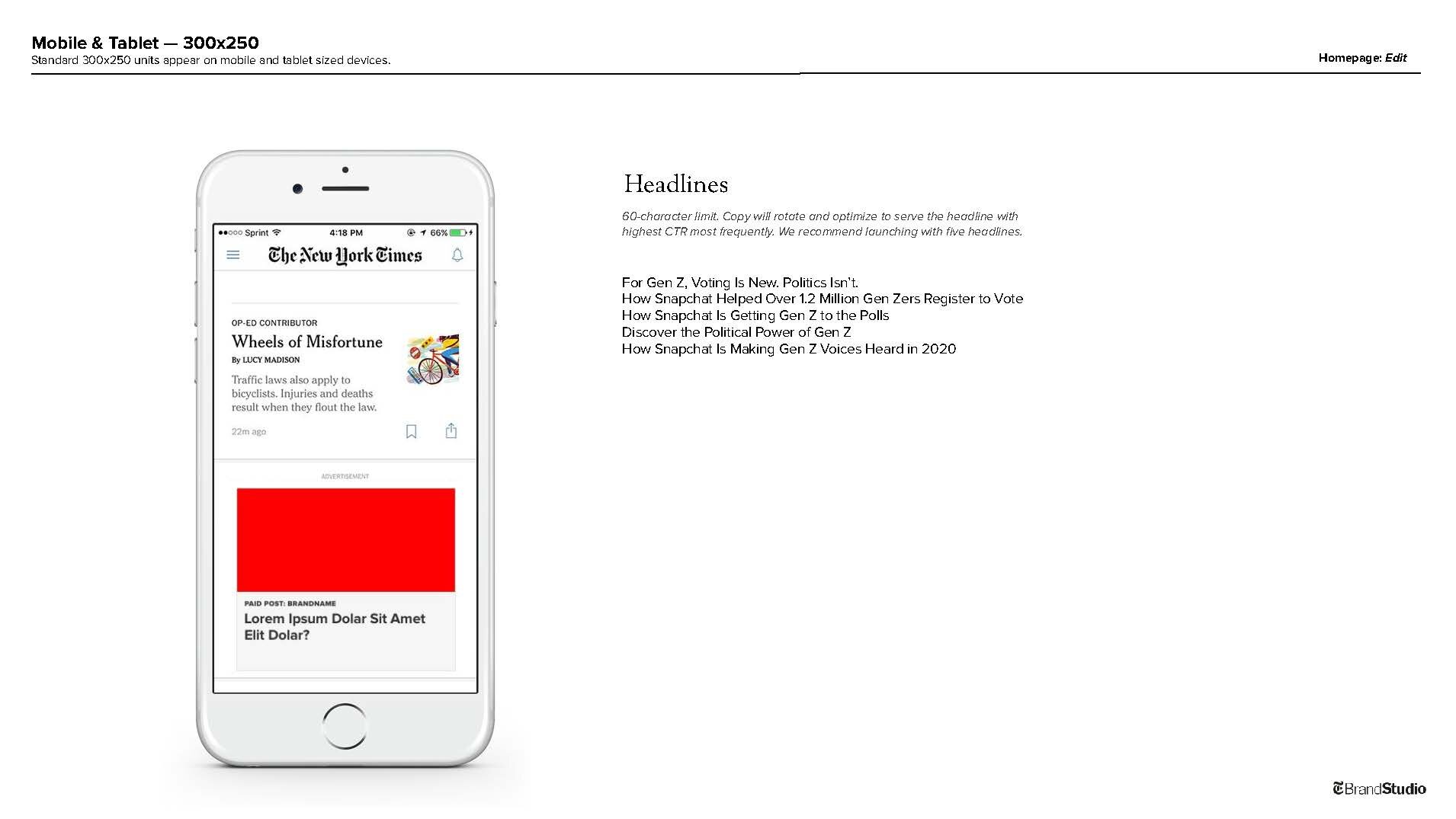
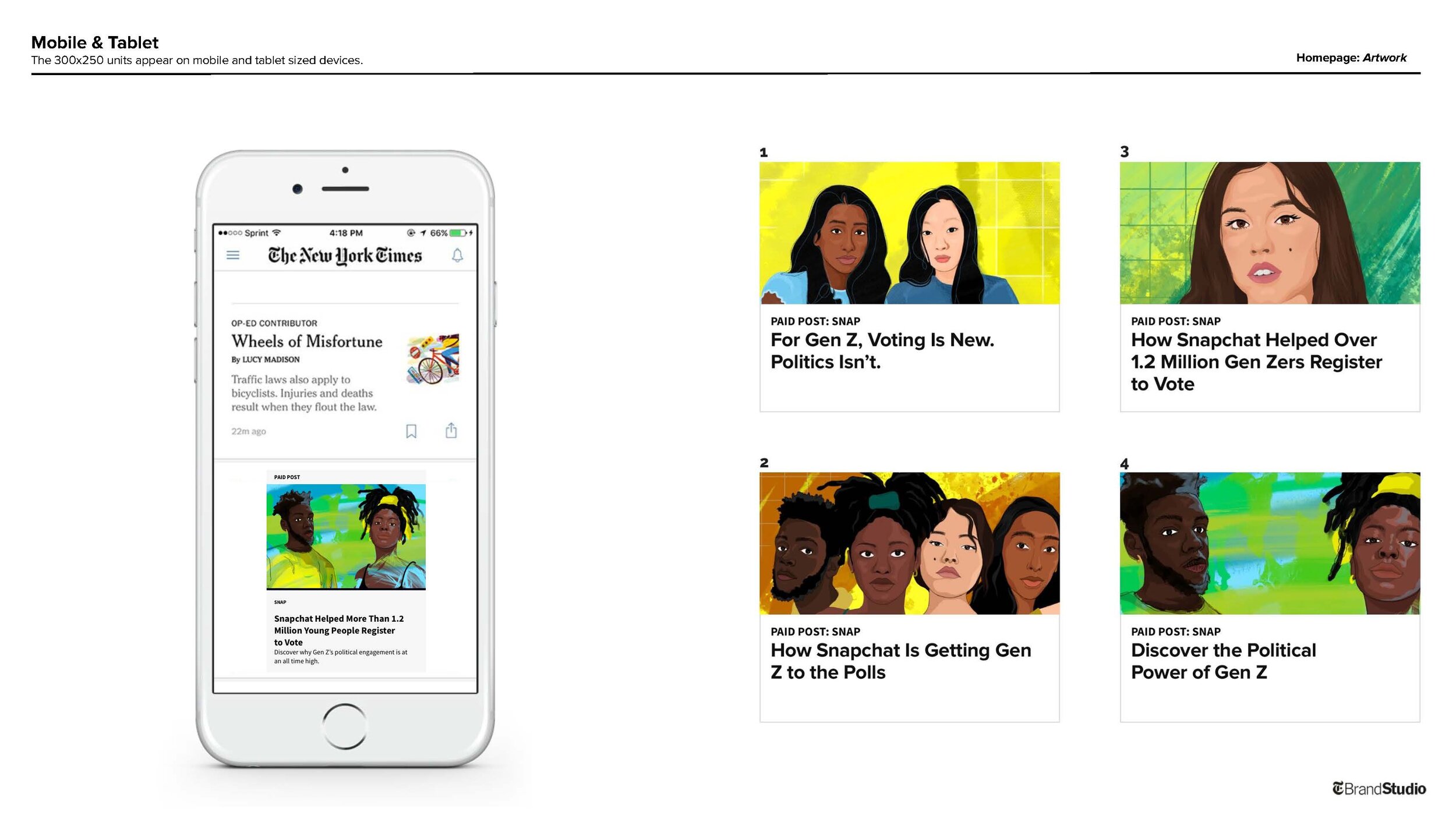

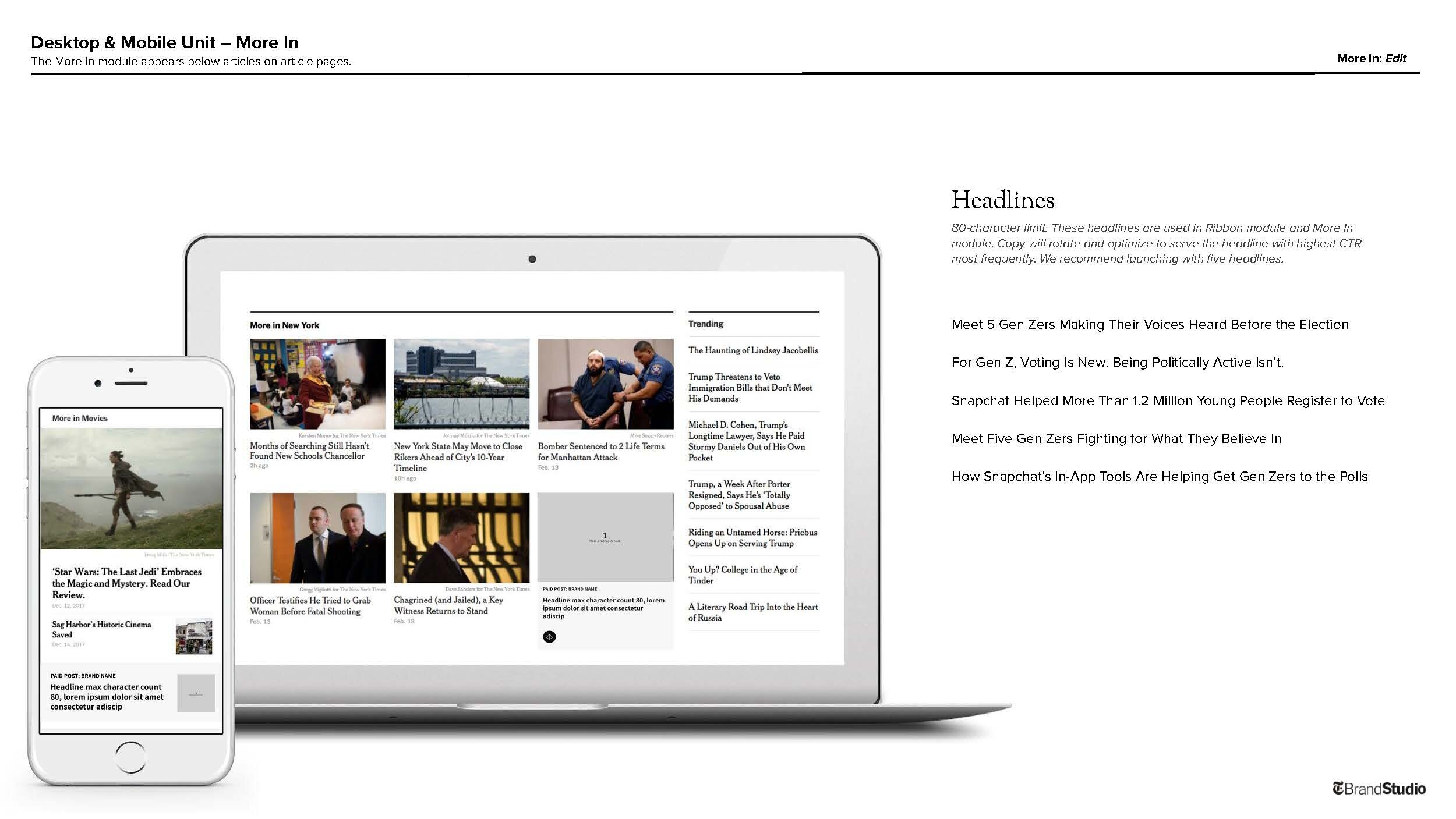

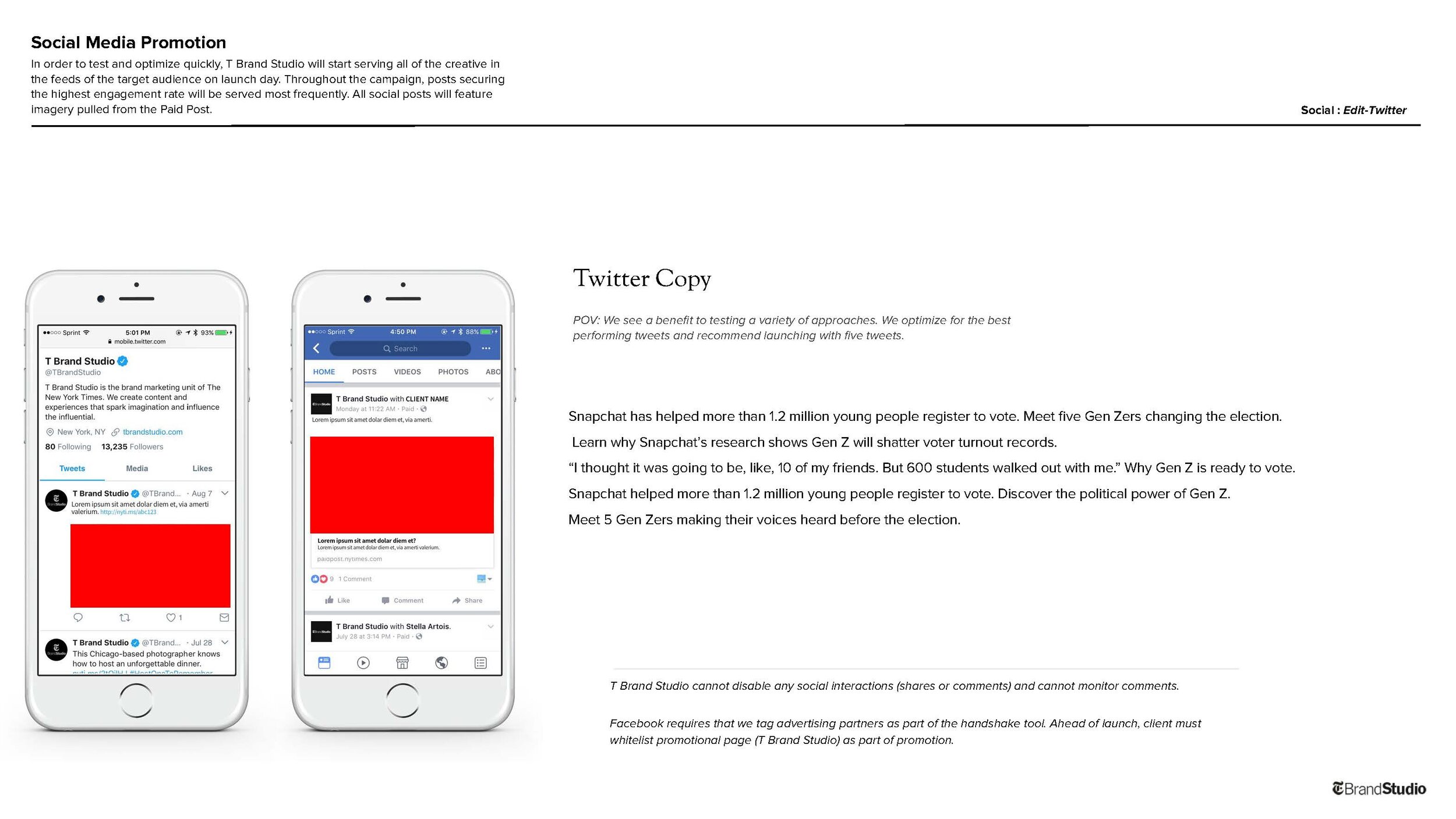
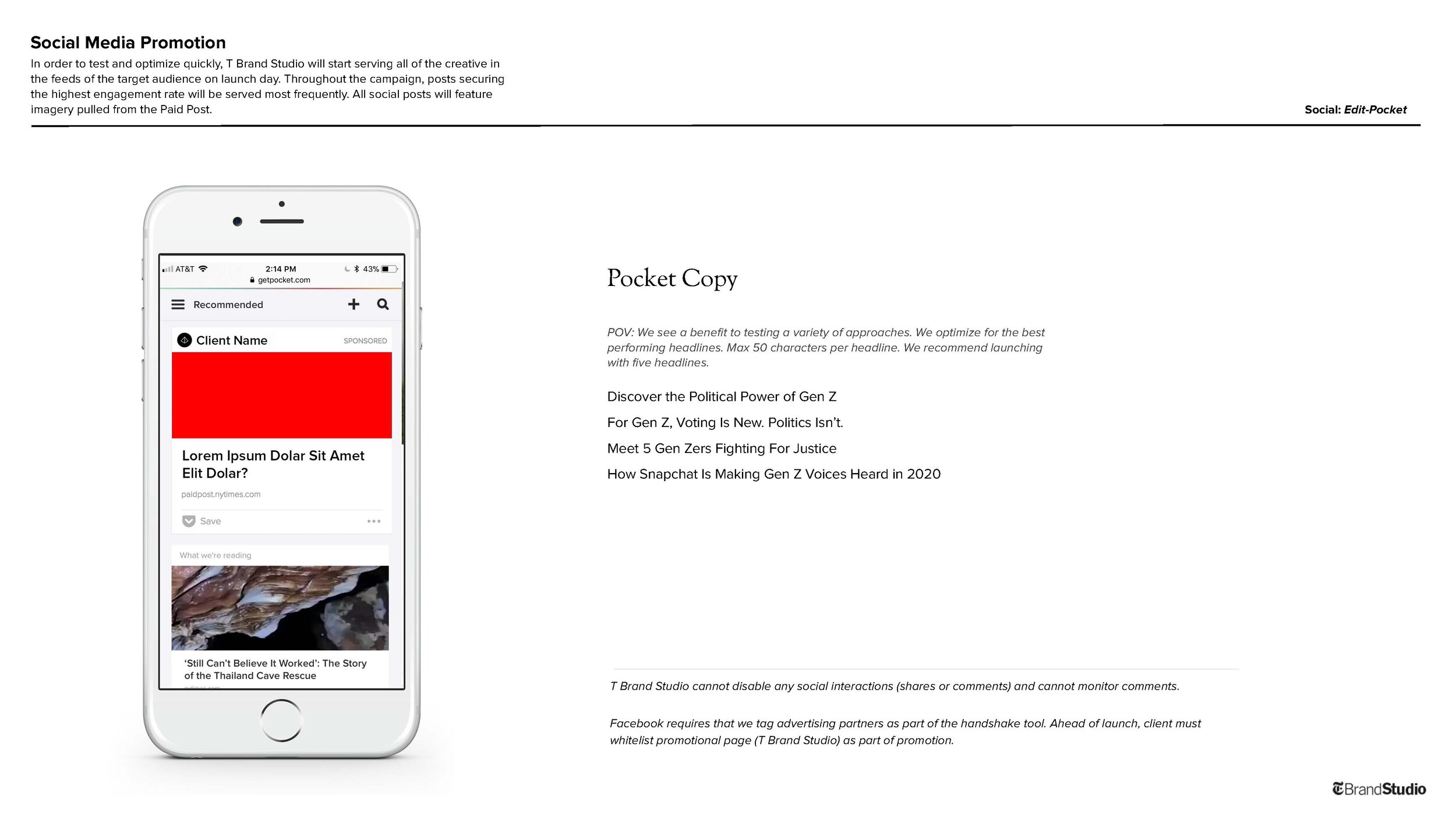
For Gen Z, voting is new. Being politically active isn’t.
Five Young People Making Their Voices Heard Before The Election
Snapchat has helped more than 1.2 million young people register to vote. It’s the platform with the greatest reach among 18- to 29-year-olds in the United States, and this election, Snapchat research shows, will have record youth voter turnout.
Why? Because the issues affecting the election feel more personal. The Covid-19 pandemic has made young people realize, now more than ever, that political leaders’ decisions affect their everyday lives, according to a report published by Snapchat in partnership with Crowd DNA, Morning Consult and the Center for Information and Research on Civic Learning and Engagement (CIRCLE).
Meet five members of Generation Z who are creating the change they want to see in their communities.
Xiye Bastida
Xiye Bastida, 18, says her purpose in life is to “fight for climate justice.” Her parents met at a climate protest in the 1990s. She was raised as a member of Mexico’s Otomi-Toltec Indigenous people. “We practiced a philosophy of reciprocity and giving back to the earth,” she says. “Like any child, I grew up thinking that everybody in the world had the same outlook on life that I did.”
But when her family emigrated from Mexico to New York in 2015, she found that wasn’t the case. She witnessed the destruction, exploitation and contamination of the planet firsthand.
Bastida wanted to stop it. So she joined her high school’s environmental club and became its president. “When I joined, the club was focusing on recycling,” she says, “but we aren’t going to recycle our way out of the climate crisis.”
Bastida organized her school’s first strike for climate justice on March 15, 2019. “I thought it was going to be like 10 of my friends, but 600 students walked out with me,” she says.
Then, on Sept. 20, 2019, she helped organize a citywide youth climate strike, and 30,000 people joined her. It was the largest climate strike New York City had ever seen.
A year later, Bastida is an organizer for the New York chapter of Greta Thunberg’s organization Fridays for Future, a member of the Peoples Climate Movement of New York and a co-founder of the nonprofit Re-Earth Initiative.
“I founded the Re-Earth Initiative because I wanted to bring my friends together to show that fighting for climate justice is a truly global movement,” Bastida says. The organization’s board consists entirely of Gen Z members, hailing from Singapore, Chile, Ireland and other locations around the world.
Re-Earth’s most recent campaign is focused on voting. The team translated voter information guides into five languages. “My generation is diverse, and we want to make our information accessible to everyone,” Bastida says.
As a noncitizen, Bastida won’t be able to vote in the upcoming election. But she’s committed to getting her generation to the polls. “A vote in the upcoming election is not just a vote for your country,” she says. “It’s a vote for the world.”
Winona Guo & Priya Vulchi
Winona Guo, 21, and Priya Vulchi, 21, believe that their friendship is an act of resistance against a school system that fails students. “We started with the premise that schools are violent places, and the only way out of that is to affirm our humanity, by loving each other when the system didn’t,” Guo says.
As sophomores in high school, Vulchi and Guo came to believe that the country’s education system was lacking. It failed to teach students how race affects every part of their life — and neglected to cultivate a fierce concern for equity and for one another.
Guo and Vulchi founded the nonprofit, CHOOSE, after “nights in our teenage bedrooms poring over Black feminist texts,” Guo says. The nonprofit’s goal? To give educators the tools they need to teach racial literacy in the classroom.
They published their first book, “The Classroom Index,” while still in high school. In their own words, the book is “a reference guide, story index and racial literacy toolbox.” It provides stories and discussion points to supplement educators’ lessons about race.
“We want to teach students how to fundamentally think about equity, justice and love — and how to live among diversity — as necessary 21st-century life skills,” Vulchi says.
In June 2019, after traveling to all 50 states and interviewing more than 150 Americans about race, identity and education, Vulchi and Guo published their second book, “Tell Me Who You Are: Sharing Our Stories of Race, Culture, & Identity.” “Sharing these stories and bringing them into the classroom is the first step to fighting inequity and creating a sustained, radical reimagining of how we understand our relationships with one another,” Guo says.
In the coming weeks, CHOOSE will publish a collection of lesson plans that uses the stories in “Tell Me Who You Are” as a resource. “Our schools are a microcosm of our society,” Vulchi says. “As students who haven’t had the chance to vote, changing our schools gives us a chance to change everything.”
Amiri Nash & Lexi Brown
Amiri Nash, 18, and Lexi Brown, 18, want to start a conversation about race. Their project, Sign of Justice, has done just that.
After the killing of George Floyd, Brown wanted to spread the Black Lives Matter message in her community. “I called Amiri, because I knew he’d be able to bring my vision to life,” she says. Together, Nash and Brown created a series of free printable signs calling for racial justice.
Their first sign read: “Killer Cops Will Not Go Free. Text ‘Floyd’ to 55156. Do not live in ignorance. Use your privilege for good.” The number brought texters to the nonprofit Color of Change’s petition to “demand the officers who killed George Floyd are charged with murder.” Nash and Brown plastered it in public spaces around their hometown, Washington, D.C., and shared it on social media.
Their message went viral. Before long, Nash and Brown’s followers had posted the sign in neighborhoods and cities across the country. “We had people from all over requesting more signs,” Nash says.
But Sign of Justice has met resistance, too. Nash and Brown have received threatening emails. Their signs have been torn down. In one instance, a man attempted to hit a group of teenagers with his bike because they had been posting the signs. (He was later charged with assault.)
These kinds of negative responses only reaffirm why they started the project. “We want to get a reaction from people,” Brown says. “We want people to be confronted with — and start talking about — racism in their own communities. And if they react negatively to our message, we want them to reflect on why they did.”
Now, Nash and Brown are starting their first year of college, at Brown University and Parsons School of Design, respectively. Though apart, they continue to create signs and brainstorm on daily phone calls.
“We know we want to do more to encourage our peers to vote,” Brown says. “Sign of Justice strives for a better world, and voting can help achieve that.”
Their ultimate goal? For Sign of Justice not to exist.
“I hope for a future where other generations won’t have to make their own version of Sign of Justice,” Nash says, “because then we will know all injustice has been conquered.”
_
Gen Zers like Bastida, Guo, Vulchi, Nash and Brown represent just how engaged young voters are. And with Snapchat, young people have the civic tools to make their voices heard at the polls.
Snapchat’s in-app resources allow users to request a mail-in ballot, make a plan to vote (in person or by mail), see a sample ballot in their district and find their polling place. Snapchat’s Voter Guide features content from the N.A.A.C.P., the A.C.L.U. and other organizations to teach users how to protect themselves against voter suppression.
Gen Z is a generation ready to hold power to account — and fight for what they believe in.



